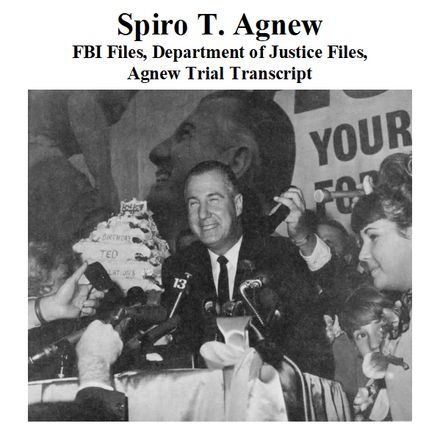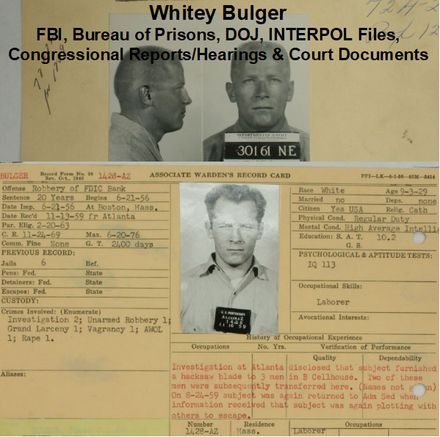Starting from:
$12.95
Home
Organized Crime
Joseph Valachi FBI Files – Congressional Hearings & Other Historical Material -
Joseph Valachi FBI Files – Congressional Hearings & Other Historical Material -
Joseph Valachi FBI Files – Congressional Hearings & Other Historical Material
2,269 pages of FBI files, Congressional hearings, oral history testimony, and other historical material related to Genovese Family soldier, and mafia informant Joseph Valachi.
Joseph Michael Valachi (1904 – 1971) was a major American organized crime figure. Also known as "Joe Cargo" he is regarded as the first major member of the Italian-American Mafia to discuss its existence publicly and give details about its methods and practices. Valachi is credited with popularization of the term cosa nostra.
In 1963, Valachi testified before a U.S. Senate committee, known as the Valachi hearings, and disclosed previously-unknown information about the Italian-American Mafia including its structure, operations, rituals and membership. His testimony was the first major violation of omertà, the mafia's code of silence, and the first concrete evidence that the Italian-American Mafia existed to be provided to federal authorities and the general public. Valachi died in 1971 while he was serving a life sentence at the Federal Correctional Institution, La Tuna.
Valachi was active since the Castellammarese War during the early 1930s, as an associate of the Lucchese crime family; however; after the murder of Salvatore Maranzano in 1931, he joined sides with the Genovese family. Valachi was a soldier in the crew of Anthony Strollo.
In 1959, Valachi was sentenced to 15 years' imprisonment for narcotics involvement. He feared that crime family boss and namesake, Vito Genovese, ordered a murder-contract on him in 1962. Valachi and Genovese were both serving prison sentences for heroin trafficking. On June 22, 1962, he murdered another prisoner in the prison yard with a steel pipe, whom he mistook for Joseph DiPalermo, a Mafia member he believed was tasked to kill him. Facing the death penalty, Valachi testified before the United States Senate Committee in 1963. He died in 1971 of a heart attack while imprisoned at Federal Correctional Institute La Tuna.
FBI FILES
546 pages of FBI Files related to Joseph Valachi. They cover briefs about murders in which Valachi was implicated, details about his murder of John Saup, while Valachi was an inmate at U.S Penitentiary Atlanta Georgia, Valachi's rap sheet, his cooperation with the FBI, his testimony before a Congressional committee, a neuropsychiatric report on Valachi, information about the shooting of Frank Costello, the work by Peter Maas which would become the book the "Valachi Papers."
Organized Crime And Illicit Traffic In Narcotics Congressional Hearing 1963
1,650 pages of testimony from the hearings also known as the McClellan Hearings or The Valachi hearings, it investigated organized crime activities across America and investigated leading organized crime figures of the era such as Sam Giancana of Chicago. The hearings were initiated by Arkansas Senator John L. McClellan in 1963. The hearings are mostly were named after the major government witness against the American Mafia, Joseph Valachi. The televised appearance of Valachi took hold of the attention of households across America.
His unprecedented testimony gave Congress and the American people their first insider's view of a criminal organization that Valachi called Cosa Nostra, or LCN, or, as Valachi explained, "our thing." In 1963, Valachi told Senators in a packed Senate caucus room about the secret criminal cartel's illicit empire, its private armies, code of conduct, and ruling body known as the Commission. Gifted with a phenomenal memory for details, he gave valuable testimony that detailed not only the activities of this criminal conspiracy, but also its membership.
His expose culminated with charts showing the names and photographs of the members of the five largest LCN families operating in New York City. That testimony, coupled with the extensive work done by this Subcommittee under the chairmanship of the late Senator McClellan, profoundly· affected not only our understanding of organized crime in America, but also how Government was to respond to it during the years that followed.
Working with Attorney General Robert Kennedy, formerly the Chief Counsel of this Subcommittee, Senator McClellan highlighted the woefully inadequate law enforcement efforts against organized crime at that time. With the exception of a few police departments, such as that of New York City, there was no organized law enforcement response to organized crimel. At the same time, little Federal attention was given to a problem which was widely held to be only of local concern.
This all changed after the appearance of Valachi. That testimony set in motion a series of important innovations that radically changed the approach to organized crime in the United States. These included the establishment of the first field office of the organized crime strike force, an increase in the number of attorneys in the Justice Department's Organized Crime and Racketeering Section and the enactment of legislative proposals, including electronic surveillance, limited immunity, and the Racketeer Influenced and Corrupt Organizations Act, today known as RICO.
ORAL HISTORY
73 pages of oral history transcripts with mentions of Joseph Valachi. Interviewees include:
William G. Hundley - Chief, Organized Crime and Racketeering Section, Department of Justice. Department of Justice (1958-1966), he also briefly served as Robert F. Kennedy’s special assistant. In this interview, he discusses Joseph M. Valachi’s cooperation with the Federal Bureau of Narcotics, Valachi’s intelligence information for the FBI, Reasons for the FBI’s interest in Valachi’s information, the Valachi televised hearings with the McClellan Committee, the disadvantages of a televised hearing, the bomb threat incident at the hearings, Hundley reflects on the McClellan Committee’s efforts, Robert F. Kennedy’s involvement in the case, significant cases in the Kennedy administration, and tensions between the Justice Department and J. Edgar Hoover, among other issues.
Cartha "Deke" DeLoach - Former deputy associate director of the FBI.
James V. Bennett - Director of the Bureau of Prisons in the Justice Department from 1937 to 1964, discusses the attorneys general under whom he served, Robert F. Kennedy’s Justice Department reforms, and J. Edgar Hoover, among other issues.
John E. Nolan - Nolan was the administrative assistant to the Attorney General, Robert F. Kennedy from 1963 to 1964.
John R. Reilly - Assistant to the Deputy Attorney General and Chief for the Executive Office of United States Attorneys for Department of Justice, 1961 – 1964
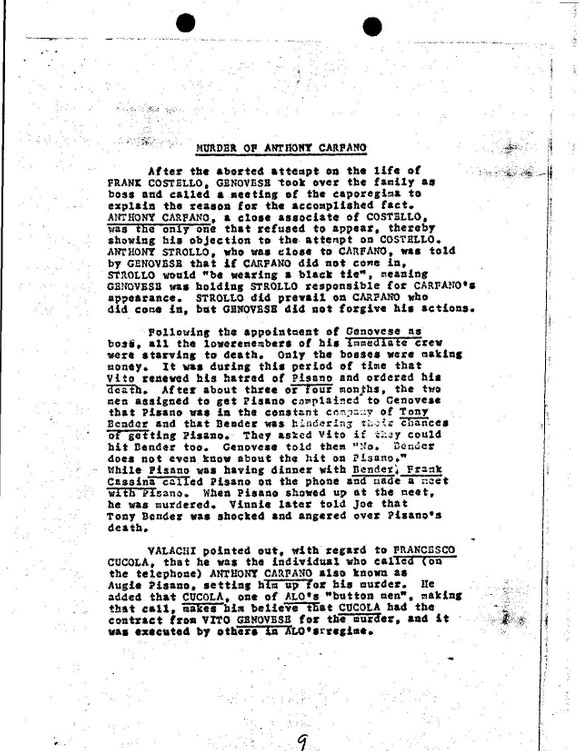
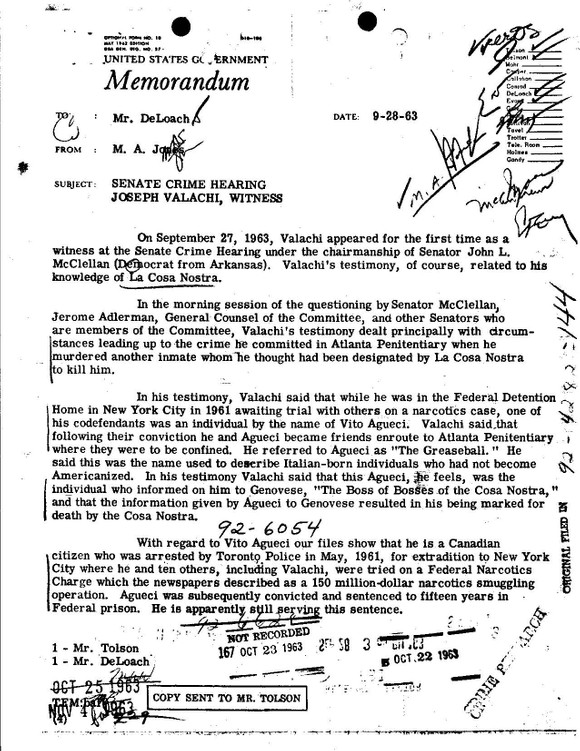

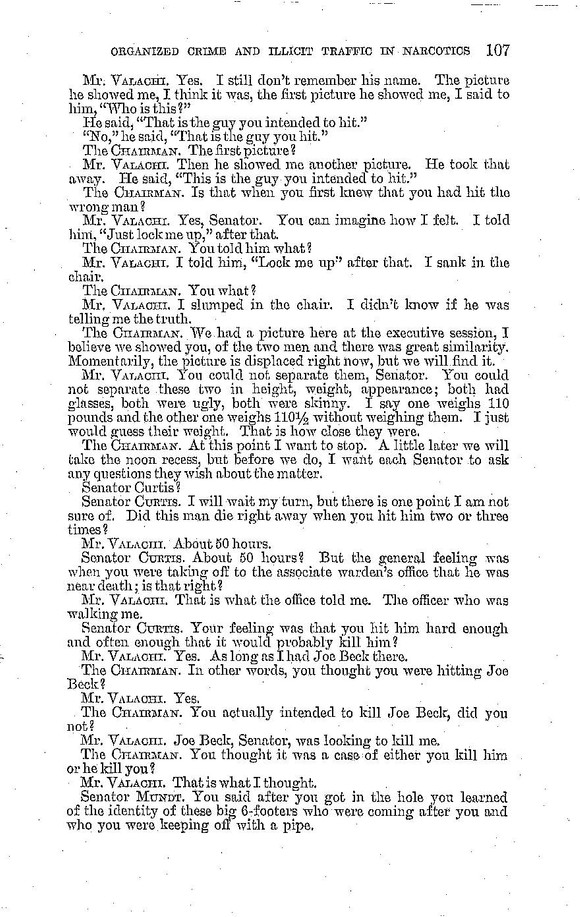

2,269 pages of FBI files, Congressional hearings, oral history testimony, and other historical material related to Genovese Family soldier, and mafia informant Joseph Valachi.
Joseph Michael Valachi (1904 – 1971) was a major American organized crime figure. Also known as "Joe Cargo" he is regarded as the first major member of the Italian-American Mafia to discuss its existence publicly and give details about its methods and practices. Valachi is credited with popularization of the term cosa nostra.
In 1963, Valachi testified before a U.S. Senate committee, known as the Valachi hearings, and disclosed previously-unknown information about the Italian-American Mafia including its structure, operations, rituals and membership. His testimony was the first major violation of omertà, the mafia's code of silence, and the first concrete evidence that the Italian-American Mafia existed to be provided to federal authorities and the general public. Valachi died in 1971 while he was serving a life sentence at the Federal Correctional Institution, La Tuna.
Valachi was active since the Castellammarese War during the early 1930s, as an associate of the Lucchese crime family; however; after the murder of Salvatore Maranzano in 1931, he joined sides with the Genovese family. Valachi was a soldier in the crew of Anthony Strollo.
In 1959, Valachi was sentenced to 15 years' imprisonment for narcotics involvement. He feared that crime family boss and namesake, Vito Genovese, ordered a murder-contract on him in 1962. Valachi and Genovese were both serving prison sentences for heroin trafficking. On June 22, 1962, he murdered another prisoner in the prison yard with a steel pipe, whom he mistook for Joseph DiPalermo, a Mafia member he believed was tasked to kill him. Facing the death penalty, Valachi testified before the United States Senate Committee in 1963. He died in 1971 of a heart attack while imprisoned at Federal Correctional Institute La Tuna.
FBI FILES
546 pages of FBI Files related to Joseph Valachi. They cover briefs about murders in which Valachi was implicated, details about his murder of John Saup, while Valachi was an inmate at U.S Penitentiary Atlanta Georgia, Valachi's rap sheet, his cooperation with the FBI, his testimony before a Congressional committee, a neuropsychiatric report on Valachi, information about the shooting of Frank Costello, the work by Peter Maas which would become the book the "Valachi Papers."
Organized Crime And Illicit Traffic In Narcotics Congressional Hearing 1963
1,650 pages of testimony from the hearings also known as the McClellan Hearings or The Valachi hearings, it investigated organized crime activities across America and investigated leading organized crime figures of the era such as Sam Giancana of Chicago. The hearings were initiated by Arkansas Senator John L. McClellan in 1963. The hearings are mostly were named after the major government witness against the American Mafia, Joseph Valachi. The televised appearance of Valachi took hold of the attention of households across America.
His unprecedented testimony gave Congress and the American people their first insider's view of a criminal organization that Valachi called Cosa Nostra, or LCN, or, as Valachi explained, "our thing." In 1963, Valachi told Senators in a packed Senate caucus room about the secret criminal cartel's illicit empire, its private armies, code of conduct, and ruling body known as the Commission. Gifted with a phenomenal memory for details, he gave valuable testimony that detailed not only the activities of this criminal conspiracy, but also its membership.
His expose culminated with charts showing the names and photographs of the members of the five largest LCN families operating in New York City. That testimony, coupled with the extensive work done by this Subcommittee under the chairmanship of the late Senator McClellan, profoundly· affected not only our understanding of organized crime in America, but also how Government was to respond to it during the years that followed.
Working with Attorney General Robert Kennedy, formerly the Chief Counsel of this Subcommittee, Senator McClellan highlighted the woefully inadequate law enforcement efforts against organized crime at that time. With the exception of a few police departments, such as that of New York City, there was no organized law enforcement response to organized crimel. At the same time, little Federal attention was given to a problem which was widely held to be only of local concern.
This all changed after the appearance of Valachi. That testimony set in motion a series of important innovations that radically changed the approach to organized crime in the United States. These included the establishment of the first field office of the organized crime strike force, an increase in the number of attorneys in the Justice Department's Organized Crime and Racketeering Section and the enactment of legislative proposals, including electronic surveillance, limited immunity, and the Racketeer Influenced and Corrupt Organizations Act, today known as RICO.
ORAL HISTORY
73 pages of oral history transcripts with mentions of Joseph Valachi. Interviewees include:
William G. Hundley - Chief, Organized Crime and Racketeering Section, Department of Justice. Department of Justice (1958-1966), he also briefly served as Robert F. Kennedy’s special assistant. In this interview, he discusses Joseph M. Valachi’s cooperation with the Federal Bureau of Narcotics, Valachi’s intelligence information for the FBI, Reasons for the FBI’s interest in Valachi’s information, the Valachi televised hearings with the McClellan Committee, the disadvantages of a televised hearing, the bomb threat incident at the hearings, Hundley reflects on the McClellan Committee’s efforts, Robert F. Kennedy’s involvement in the case, significant cases in the Kennedy administration, and tensions between the Justice Department and J. Edgar Hoover, among other issues.
Cartha "Deke" DeLoach - Former deputy associate director of the FBI.
James V. Bennett - Director of the Bureau of Prisons in the Justice Department from 1937 to 1964, discusses the attorneys general under whom he served, Robert F. Kennedy’s Justice Department reforms, and J. Edgar Hoover, among other issues.
John E. Nolan - Nolan was the administrative assistant to the Attorney General, Robert F. Kennedy from 1963 to 1964.
John R. Reilly - Assistant to the Deputy Attorney General and Chief for the Executive Office of United States Attorneys for Department of Justice, 1961 – 1964





1 file (178.6MB)


